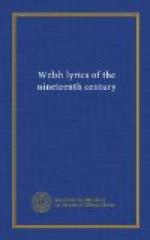No sooner come the daisies fair
To fleck the meadows green,
Than thy untrammelled notes are heard
Rising the brakes between.
Hast thou some star in yonder heights
To guide thee on thy way,
And warn thee of the changing years
And seasons, day by day?
Fair visitant, the time of flowers,
We welcome now with thee,
When all the birds’ unnumbered choir
Warbles from every tree.
The schoolboy on his truant quest
For flowers, wandering by,
Leaps as he hears thy welcome note
And echoes back thy cry.
To visit other lands afar
Thou soon wilt flying be;
Thou hast another spring than ours
To cheerly welcome thee.
For thee the hedgerows aye are green,
Thy skies are always clear,
There is no sorrow in thy song,
Nor winter in thy year!
GWILYM MARLES.
William Thomas was born in Carmarthenshire, 1834. After graduating at the University of Glasgow, he entered the Unitarian ministry. He died December 11th, 1879. He seems to have published one volume of poetry in 1859, but most of his works are still in Ms. Judging from the specimens given in the “Llenor” No. 3 (July, 1895), their publication would be a real service to Welsh literature.
New Year Thoughts.
As to the dying year I bade farewell,
Within my hands she left a mantle dark,
Whereon mine eyes did mark
Loved names I scarce for blinding tears could read;
But from its folds fresh blushing flow’rets
fell
Of that fair spring-tide I had mourned as dead.
And now her youngest sister draweth nigh,
’Neath modest starlight and with noiseless feet,
Whom thousands flock to greet—
Thousands of every age, who fain would know,
As in her face each peereth wistfully,
What fate she bringeth—happiness or woe?
She answereth not, but pointeth silently
To where far off the hidden future lies,
All dark to mortal eyes,
Save where, from out the gloom, faint stars appear.
She will not linger—haste and thou shalt
see
From chaos order as thou drawest near.
Who in this new God’s acre?
Who in this new God’s acre first shall rest?
Or gallant youth, or baby from the breast?
Or age, beneath it’s crown of snow-white hair?
Or queen of smiles and charms, some maiden fair?
Time only can the answer give—and God,
Who first shall lie beneath the upturned sod.
It matters not; whom e’er death first may reap
Here in a Father’s arms shall quiet sleep,
The tender flowers shall grow above his head
And drink the dews that fall upon his bed.
The silent grave is safe from foolish sneer
And persecutor’s rage is baffled here.
Who first shall rest here? Ah! the days
soon come,
When all the love of many a village home
Shall centre round this spot, where kith and kin
Are laid to rest, this virgin soil within.
From far and near men by the graves shall stand
Of friends who rest within the Better Land.




